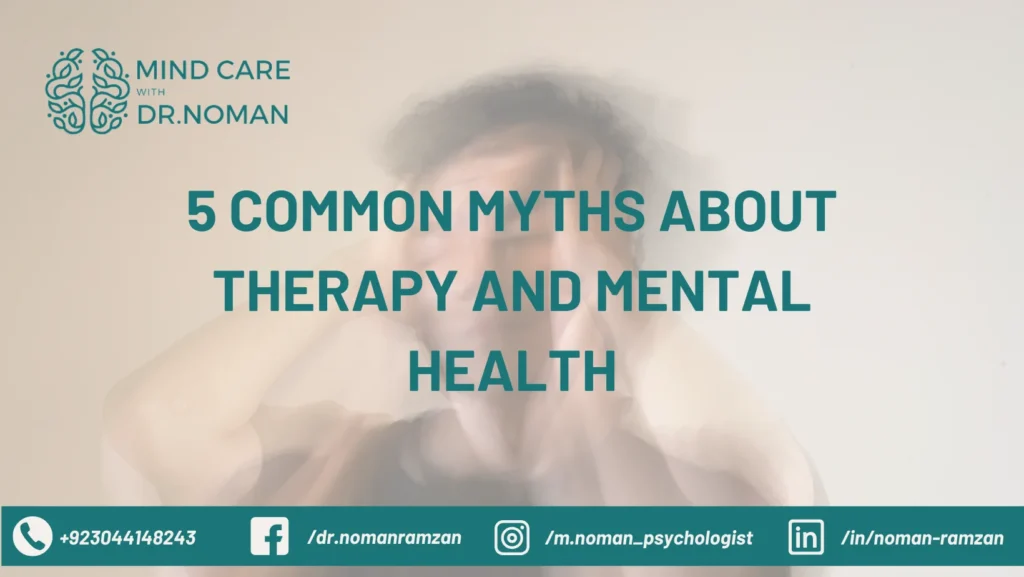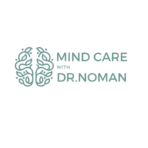
Therapy is often misunderstood, and the myths about therapy surrounding it create unnecessary barriers for those who could benefit from it the most. Whether you’re facing personal challenges, dealing with stress, or simply looking to better understand yourself, therapy can be a life-changing tool. Unfortunately, misconceptions about therapy and mental health keep many people from seeking the help they need.
In this article, we’ll explore five common myths about therapy and mental health, debunk them with facts, and help you see why therapy is not just for a select few but for anyone who wants to improve their well-being.
Myth 1: “Therapy Is Only for People with Serious Mental Illness”
One of the most pervasive myths about therapy is that it’s only for people with severe mental health conditions like schizophrenia or debilitating depression. This couldn’t be further from the truth.
Why It’s a Myth:
Therapy has often been portrayed in movies and media as a last resort for individuals at their breaking point. This depiction reinforces the idea that seeking therapy means something is “wrong” with you.
The Truth:
Therapy is for everyone. It’s not just for managing mental illnesses but also for:
- Coping with daily stress.
- Navigating major life changes like a career shift or a breakup.
- Improving relationships and communication skills.
- Enhancing personal growth and self-awareness.
Seeking therapy doesn’t mean you’re weak or broken. It means you’re proactive about taking care of your mental and emotional health.
Myth 2: “Therapists Will Judge Me or Think I’m Weak”
Fear of judgment is a significant reason people hesitate to see a therapist. Many believe their struggles aren’t “bad enough” to warrant professional help or worry they’ll be looked down upon.
Why It’s a Myth:
Society often stigmatizes vulnerability, equating it with weakness. This stigma makes individuals wary of opening up, even to trained professionals.
The Truth:
Therapists are not there to judge you. They are trained professionals who provide a safe, confidential, and non-judgmental space to help you work through your challenges. Therapy is about empowerment, not judgment.
Therapists work with people from all walks of life and understand that every person’s struggles are valid. Whether you’re dealing with anxiety, relationship issues, or workplace stress, therapy can provide tools to navigate life more effectively.
Myth 3: “Therapy Is Too Expensive and Time-Consuming”
A common concern is that therapy is unaffordable or requires a significant time commitment. While these concerns are valid, they don’t tell the full story.
Why It’s a Myth:
Therapy is often associated with private sessions that seem out of reach for many budgets. Additionally, people assume they’ll need to commit to weekly sessions for years.
The Truth:
Therapy doesn’t have to break the bank or consume all your time. Here’s how it can be more accessible:
- Affordable Options: Many therapists offer sliding scale fees based on your income. Online therapy platforms often provide more affordable rates than in-person sessions.
- Insurance Coverage: Check with your health insurance provider to see if therapy is covered under your plan.
- Short-Term Models: Certain approaches, like Cognitive Behavioral Therapy (CBT), are structured to deliver results in a limited number of sessions.
Investing in therapy is an investment in your overall well-being. It can help you save time and money in the long run by improving your productivity, relationships, and quality of life.
Myth 4: “If I Start Therapy, I’ll Be in It Forever”
Some people avoid therapy because they think it’s a never-ending process. The idea of an open-ended commitment can feel overwhelming.
Why It’s a Myth:
This misconception arises from a lack of understanding about how therapy works. While some individuals choose long-term therapy, it’s not a requirement for everyone.
The Truth:
Therapy is highly individualized. The duration depends on your goals, needs, and preferences. Here are a few points to consider:
- Short-Term Goals: Many people enter therapy with a specific issue in mind, like managing anxiety or improving communication, and complete their sessions once they’ve achieved their goals.
- Flexible Approach: You can pause or end therapy whenever you feel ready. It’s a tool you can use as needed.
- Ongoing Support: Some people find value in maintaining a long-term therapeutic relationship, but this is entirely optional.
The key takeaway? Therapy is not a life sentence—it’s a resource you can use on your terms.
Myth 5: “Therapists Just Sit There and Listen”
One of the most enduring stereotypes about therapy is that it’s simply a place to vent while the therapist nods silently. This oversimplifies the therapeutic process.
Why It’s a Myth:
Movies and TV shows often depict therapists as passive listeners who offer little more than a few head nods and vague affirmations.
The Truth:
Therapy is an active and collaborative process. Therapists use evidence-based techniques to guide you toward understanding and addressing your challenges. Here’s what therapy often involves:
- Skill-Building: Learning tools like mindfulness, emotional regulation, and stress management.
- Problem-Solving: Working together to identify and overcome obstacles in your life.
- Goal Setting: Collaboratively establishing and achieving personal or professional goals.
Therapists are active participants in your healing journey, providing insights, strategies, and support tailored to your needs.
The Benefits of Therapy
Now that we’ve debunked these myths, let’s focus on what therapy can truly offer:
- Improved self-awareness and emotional intelligence.
- Better coping mechanisms for stress, anxiety, and other challenges.
- Enhanced relationships and communication skills.
- A safe space to process emotions and experiences.
Therapy isn’t about fixing what’s broken—it’s about empowering you to thrive.
Seeking Help?
If you’ve been hesitating to seek therapy because of these myths, now is the time to reconsider. Therapy is a valuable resource for anyone looking to improve their mental health, build resilience, and lead a more fulfilling life.
Ready to take the first step? Reach out to a Psychologist Noman Ramzan or explore online therapy options to find the right fit for you.
Conclusion
Breaking down these common myths about therapy and mental health is essential to creating a more open and supportive society. By understanding the truth behind these misconceptions, we can encourage more people to seek the help they need without fear or stigma.
Remember, seeking therapy isn’t a sign of weakness—it’s a testament to your strength and commitment to your well-being. Take that step today and experience the transformative power of therapy.


